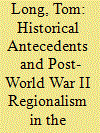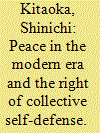| Srl | Item |
| 1 |
ID:
120553


|
|
|
|
|
| Publication |
2013.
|
| Summary/Abstract |
International Affairs: How do you assess the dynamics of Russia-NATO relations today and what is the main prerequisite for the constructive development of these relations?
A. Grushko: There are dynamics, but sadly, the changes in the Euro-Atlantic military-political landscape today are clearly lagging behind the trends of integration, interdependence in all key areas of interstate and economic ties. As far as Russia is concerned, absolutely all vectors of its development are linked to increasing interaction with the outside world and further integration into global economic processes.
|
|
|
|
|
|
|
|
|
|
|
|
|
|
|
|
| 2 |
ID:
173006


|
|
|
|
|
| Summary/Abstract |
After World War II, the US-led international security order exhibited substantial regional variation. Explaining this variation has been central to the debate over why is there no nato in Asia. But this debate overlooks the emergence of multilateral security arrangements between the United States and Latin American countries during the same critical juncture. These inter-American institutions are puzzling considering the three factors most commonly used to explain divergence between nato and Asia: burden-sharing, external threats, and collective identity. These conditions fail to explain contemporaneous emergence of inter-American security multilateralism. Although the postwar inter-American system has been characterized as the solidification of US dominance, at the time of its framing, Latin American leaders judged the inter-American system as their best bet for maintaining beneficial US involvement in the Western Hemisphere while reinforcing voice opportunities for weaker states and imposing institutional constraints on US unilateralism. Drawing on multinational archival research, the author advances a historical institutionalist account. Shared historical antecedents of regionalism shaped the range of choices for Latin American and US leaders regarding the desirability and nature of new regional institutions while facilitating institutional change through mechanisms of layering and conversion during this critical juncture.
|
|
|
|
|
|
|
|
|
|
|
|
|
|
|
|
| 3 |
ID:
105212


|
|
|
|
|
| Publication |
2011.
|
| Summary/Abstract |
This paper explores the policy choices of Germany and Japan for contributing to international security and stability in Afghanistan. Both countries have been closely involved with Afghanistan in the aftermath of the 9/11 attacks 2001. It is argued that the policy choice of Japan with a low military element and high civilian element differs significantly from the German military centered approach. An analysis of the goals and motives behind the foreign policy choices reveals that in Germany the military involvement has been justified with humanitarian reasons, national self interests and the right to "unlimited" sovereignty. This logic has ultimately led to the acceptance of civilian casualties and participation into offensive counterinsurgency operations. It is suggested that elite driven discourses have determined foreign policy strategy. In the case of Japan the paper claims that the conservative LDP elite had been pushing for intensified military involvement which materialized in the dispatch of military vessels to the Indian Ocean and ground forces to Iraq. Similar to Germany these moves towards gaining international reputation were rooted in domestic politics.
|
|
|
|
|
|
|
|
|
|
|
|
|
|
|
|
| 4 |
ID:
128255


|
|
|
|
|
| Publication |
2013.
|
| Summary/Abstract |
The argument for constitutional revision has been ongoing in the post-war era but until now no action has been taken. The focal point in the discussion has been Article 9. This article argues that Japan's peace posture has not been guaranteed by Article 9. The article then turns to the right of collective defense and whether reinterpretation of Article 9 language is required in the current security environment. The conclusion calls for active and specific dialogue to resolve this issue in a timely manner.
|
|
|
|
|
|
|
|
|
|
|
|
|
|
|
|